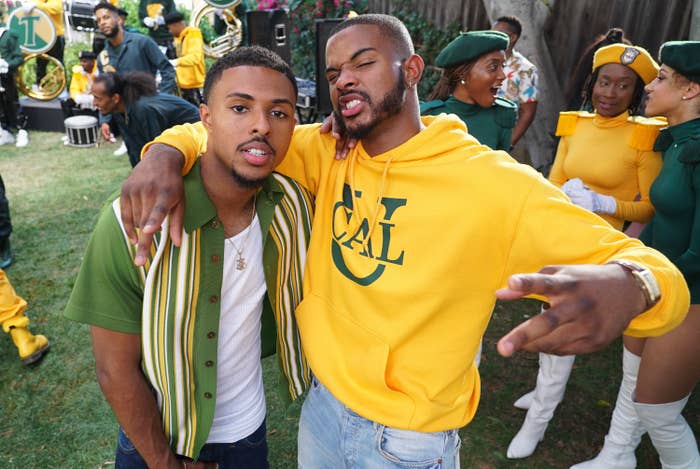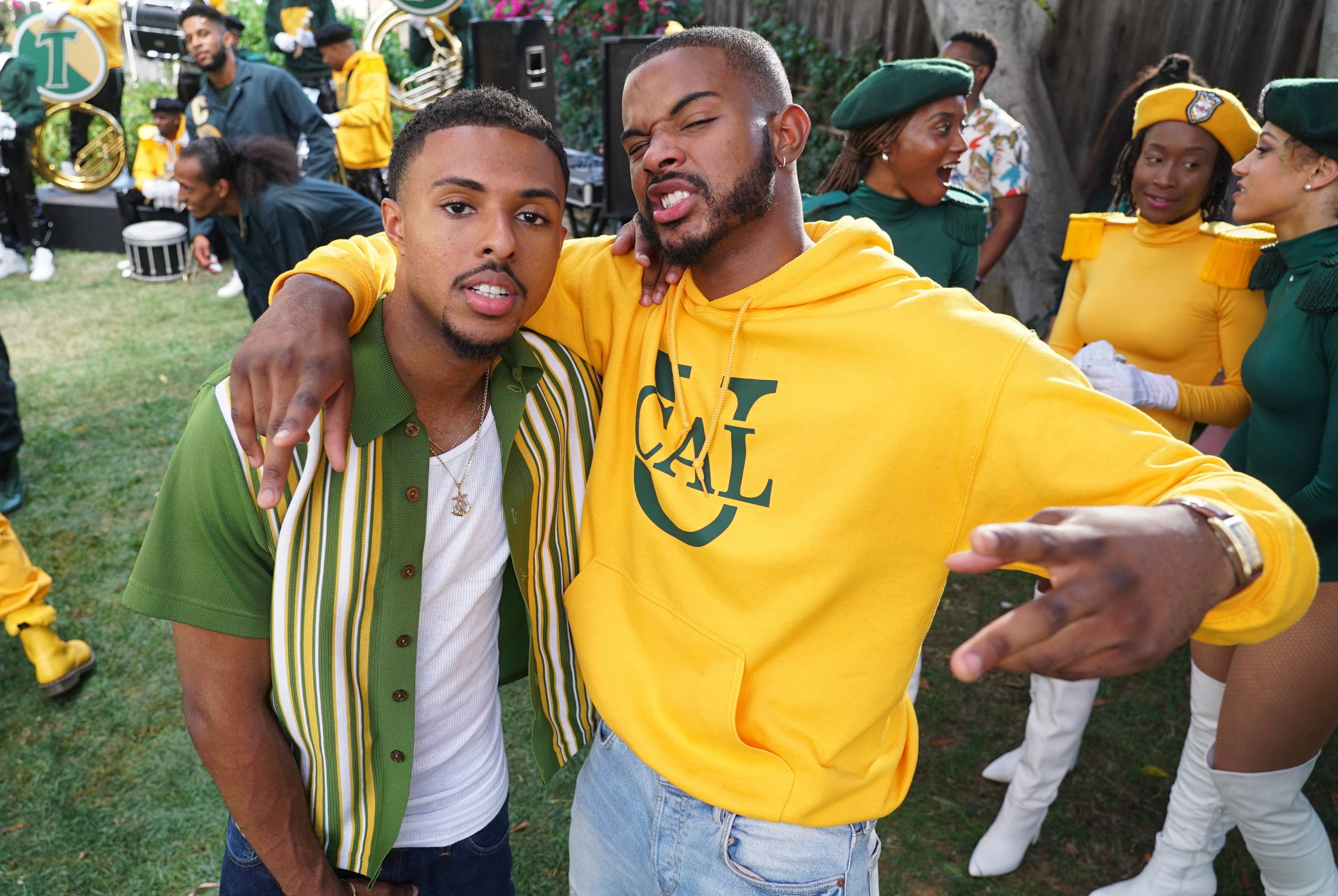
Diggy Simmons and Trevor Jackson are not only Grown-ish co-stars but they also share similar views of the world. The actors are now in Season 4 of the Freeform show, and while it kicked off with lighthearted episodes and a wild Mexican vacation, the tone of the show takes a serious turn in Episode 5, titled “A Boy is A Gun,” and Episode 6, titled “Put Your Hands Where My Eyes Could See.” The storyline unravels as the characters react to the news of an unarmed Black man being shot by police. Jackson and Simmons’ characters—Aaron and Doug, respectively—share a special connection in these episodes. Aaron has always been the outspoken activist on campus, and this time, he steps in to help Doug who is having a hard time coping due to the disappointment of seeing the police brutality cycle repeat without resolution.
Everyone reacts differently to traumatic events of this nature, and the show is providing different perspectives through each of its characters. While some are eager to raise awareness on campus, at protests, and via social media, Doug is apprehensive about it—and his friends begin to question if he even supports the Black Lives Matter movement, calling him a “bad Black person.” The Cal U students join the protests for racial justice and equality in Los Angeles while also coming to terms with the fact that there is no right or wrong way to react to Black people being murdered by police. Doug is hesitant to speak out knowing that no matter how vocal people are in the streets or on Twitter, there’s little change. Complex sat down with Jackson and Simmons to unpack the heftiness of these episodes, and they shared their thoughts on how it was like to film them, performative social media activism, cancel culture and what they believe is necessary to effect real change in our society.
Like Doug, Jackson found himself being silent on social media while the world shouted in horror following the murders of George Floyd and Breonna Taylor by police in 2020. “I think Digg’s character, I kind of related to a lot when we were all going through the situations that have been taking place with injustice and things like that,” Jackson said. “Black people, in general, have been dealing with it for a very long time. I think what’s missing sometimes is the process of the emotion before the reaction. I felt a lot of people wanted attention more so than healing.” Fans also often look at their favorite artists and rely on them to use their large platforms to raise awareness about world issues. In the event that someone doesn’t, it’s almost standard for people to call them out or attempt to “cancel” them if they choose to remain silent. “I think holding them accountable is one thing. But for me in particular, I am Black, and for the longest time, I didn’t say anything. Where was everybody at when Philando Castile was shot? I just felt like there were so many other things. Now it felt trendy to me and I didn’t like that because it was so personal for me,” Jackson added. “I didn’t speak out because I’m just processing it. I did make a video saying the reason I haven’t said anything or gone to protests for me personally is because I’m too emotional at a protest. I would be the person that got shot at the protest. Because you’re not going to touch my family or any family members that I’m with or friends with the baton and me not go after you. That is just the reaction. So I know myself. I think that’s important, to know yourself and how you deal with things. And I was very emotional. So I didn’t want to say anything out of pure emotion. I wanted to be logical as well. Everybody handles it differently. But I do appreciate the positives of social media and how you can kind of change the narrative and hold people accountable. But other times I do think it’s like, ‘Yo, we’re humans, too.’ It’s like we got to go through it just like you do and know how we feel about it.”
Sometimes celebrities do speak out in support and find themselves in hot water for saying the “wrong” thing. Jackson suggests that people process their thoughts and feelings before sharing them with the world. “It’s very important to know how you feel about anything before you react, before you put yourself into it because then it’s not real. I think murder one, and then the murder of a certain race for such a long time is so important to me that I’m not just going to jump on any kind of bandwagon. I’m going to know how I feel about it and internally process my emotions, and really just uncover how I feel about something,” he shared. “I think the show did a very good job of showing both reactions. I’m sure there are more reactions, those aren’t the only two ways.” Another theme that Jackson has noticed on social platforms is the way we culturally react to news and our ability to quickly move on to the next thing. “I was talking about that the other day, not just with people that are passing that way (police brutality), but people in general that pass. Oh, we’re sad for today. And then the next day we’re getting the next thing. I remember back in the day when artists or people of importance would die, there would be mourning for months. And everyone is just going through it together. Now it’s like, ‘Oh, okay. The next thing, the next thing.’”
Sharing posts on social media is also not enough without doing any work in the real world. Many companies and celebrities posted a black square in 2020 to express their solidarity with the Black Lives Matter movement. Some also committed to donating money and continued sharing resources, while others chose to not say anything at all and faced backlash. On Grown-ish, Doug doesn’t see the point in sharing his thoughts on social media or spreading awareness, because he believes it won’t change anything. “It was a big theme that we saw last year, right? People were getting called out or people getting ‘canceled.’ And then everybody having to take a step back and say, ‘Hey, are we becoming desensitized to these really personal issues?’ People aren’t able to take that step back and see what’s good with their mental and make sure they’re checking in with their people before we just go ahead and post things, and seeming like that’s the most important thing for us to do. So it was really nice that we came at it from this angle,” Simmons told Complex. “Because it’s so highlighted now. Getting things on social media and content, having to separate the content and real-life situation[s]. What’s fake accountability holding and what’s real accountability holding? It was a performative social media thing. You saw when certain brands came out or corporations, they had messages of solidarity and a lot of other companies, or other people of influence wanted to do the same. It felt like it was a safety blanket. Like, ‘Oh, at this certain time, people are not forgetting about this. So let me do this so people can stay off my back.’ So who really knows who’s real? Who means it? Who doesn’t it? Actions show, at the end of the day. So, we shall see.”
While social media could be harmful and a facade in many ways, it can also bring about change when you use it for good. The sharing of videos and hashtags on various social platforms has brought global attention to many police brutality cases and other instances of racial injustices. “Even with the killing of Breonna Taylor. That also brought massive news attention that was needed. So social media, I’d say, it’s a double-edged sword. As much as it helps us, it can hurt us as well. And I think it’s just a never-ending act of trying to find balance with just with how you use it, that’s it,” Simmons said. “It’s designed to keep us on there. So even if it seems that we’re constantly looking at news about racial injustice, it’s going to give us more of that. And that’s what we were doing during the pandemic, right? We were just infusing all of this information, and then we are wondering why we are so drained and so tired. It’s probably because we need a break. For the people that didn’t want to digest this information in that same way, those were the people that were getting canceled or whatever it is.” His co-star agreed. “I think it’s The Law of Polarity, man. Any situation that goes on, there’s going to be good and bad with it. And exactly like Digg said. It’s about finding the balance,” Jackson added. “And it’s difficult in a world where it’s not balanced at all.”
Hollywood is also reacting to the rise in conversations regarding police brutality and racial injustice by greenlighting projects like The Hate U Give and Two Distant Strangers. As a Black-ish spinoff, Grown-ish has covered these topics extensively in previous seasons. While we’re constantly flooded with videos and infographics on social media and on the news, is it necessary for these conversations to also continue in movies and television? “So me and Diggy have talked about this before, and I talked to somebody about this. I think it’s a balance. But I do think that if you fuel your mind and your energy and your body with a certain thing, it will only produce that thing. It’s good to make people aware, but it’s also good to fill someone’s mind with the solution. And even stories that don’t involve that so that a little kid does watch them and be like, ‘Oh.’ I don’t think it’s OK to be ignorant,” Jackson said. “You should know the history of things. But also that shouldn’t fill your space every time I see someone who’s white or every time a white person sees someone’s Black, the first emotion shouldn’t be the conflict. Otherwise, it will never be a peaceful place. We’ll never be in a peaceful world if that’s always the initial energy. I want my kids to live in a world where they don’t see that, they don’t feel that. And in order to do that, we’ve got to create worlds and create places. That’s why I love so many superhero movies because it makes me feel like those things are possible. So you have to create this world. While also, as I said, not being ignorant to the history, but you got to promote love and goodness too in the right way. But again, it’s a fine line, it’s a balance.”
Simmons added a valid point. “I feel like people put too much pressure on the arts and entertainment for being the only way that people receive information about this stuff. What about the school curriculum? What about our textbooks changing? These things [are] changing so that kids would grow up to be adults. They actually know the real history of Black men and women. I say that that’s what I want to see change first. And that’s what I want to see more of first,” he said. “You really have to dig for this stuff. The information that I’ve found out about us for real, didn’t come from the school curriculum. It came from my own research. But a lot of people may not have time or that privilege to be able to even want to look these things up or to research these things. You have to unlearn all of these things and then you have people in positions of power who want to realize why our community may be products of our own environment. I commend Trevor so much because he puts real importance on making sure his fam sees outside of where he’s from in Indiana. He’s always like, ‘Yo I’m having my cousin down here.’ And a big part of that is being able to have our people see more than just our block radius.”
It’s sometimes easy to forget that the artists and creators that are bringing these topics to the screens are also human beings who are processing these heavy events right along with their audiences. These two episodes were being filmed in April as the Derek Chauvin verdict was announced, which added to the emotions of filming scenes that imitated what was happening in real life. When I asked Simmons and Jackson what that was like, they compared shooting these scenes to therapy. “It’s emotional. I mean, that’s also the beauty of this show is that it juxtaposes in that way. It has the more lighthearted comedy. Even though it’s very serious, you can still feel that light. Sprinkling a little bit of the medicine into the ice cream that’s how you get somebody to be able to digest it, right? Our writers and our producers do a good job of finding that even balance,” Simmons said. “That was the most that I ever opened up to any of this, was that monologue that I had to do at the end and kind of preparing for that and getting myself there emotionally. I obviously knew how I felt about these things, you feel affected personally, especially as a Black man. But you really don’t know until you sit down with the information and what’s going on. So, I feel like this episode was therapeutic for the whole cast.”
Jackson said he had a breakthrough about the feelings he was suppressing while filming. “Shooting that was very hard. I remember we were shooting the ‘Strange Fruit’ scene. I’ve heard the song before, but hearing it that many times while shooting, I was like, ‘Whoa, what’d he say?’ And every time it came back, I was like, ‘Well, there’s another line she wrote.’ And I was just like, ‘Nothing’s changed, one. Two, this wasn’t that long ago. Three, why don’t I ever access this part of my brain?’ I always keep it quiet. That slavery was a thing. All of these horrible things happened. All of these things happen to people like me. So I suppressed a lot. I realized how much I was suppressing. I was like, ‘Whoa.’ And I started bawling when we were shooting.”
There is so much to learn from being on any show for four seasons, especially one that challenges the actors to examine themselves and the world around them. “I’ve learned a lot, to be honest. Everything that Aaron has done in the show, I’ve been informed about. My politics and my method and the way I do things is through love and music and I create. And he’s very by the book. So I’m learning a lot more intricate things about it, in general. I remember one of my favorite episodes was the college episode about the ballplayers. And just even the divesting in different prisons and things like that. These are all things that maybe I had an idea about, but didn’t realize how in-depth it went. So I’ve definitely learned a lot from my character. And again, thank you to the writers,” the “Just Friends” singer said. “So it’s been amazing and it’s crazy. As they say, playing something like this is so crazy when you don’t go into it knowing that this is what it is. Me just being someone like, ‘Hey, I want to do good in life,’ right? And maybe I don’t know the exact way to do it. ‘Oh, I’m going to be on this show.’ Now, this show is talking about worldly issues, that’s transitioning and doing the exact thing that I wanted to do without me having the knowledge of it before I went in there. It is pretty kind of eerie how aligned it was.”
For Simmons, playing Doug has helped him be more open in his personal life. “Back to suppressing emotions, right? Not allowing myself to open up to the things that are really inside of me and what that can unlock and how free you can feel when you don’t hold things in. Whether it’s grudges or just plainly your emotions about your own life experiences,” the actor said. Grown-ish targets a younger audience but the lessons the characters learn and the situations they face are very much rooted in reality and are able to help viewers of all ages navigate through their own feelings and struggles. Simmons and Jackson are older than the characters they portray but at 26 and 24, the actors already possess a deep understanding and wisdom of their reality as celebrities and what it means to be socially aware. Tune into Grown-ish on Freeform on Thursdays at 8 p.m. ET and on Hulu.



